A Devex event in partnership with Global Financing Facility
Reclaim the Gains: Addressing COVID-19’s secondary health crisis for women, children and adolescents
September 29, 2021 — 9 a.m. ET | 3 p.m. CET
WatchAbout the Event
The COVID-19 crisis is reversing years of hard-won gains for women, children, and adolescent health and human capital outcomes. More than one year on, with disrupted health systems stretched to the breaking point and economies severely impacted, women, children and adolescents in the world’s poorest countries have been hardest hit by a secondary crisis that threatens to roll back the remarkable gains made over the last decade.
The world was making steady yet uneven progress in improving health outcomes for women, children and adolescents. Amid better access to family planning, skilled birth attendants, and better nutrition, the newborn mortality rate almost halved worldwide between 1990 and 2018.
Now, the pandemic is reversing hard-won gains on the Sustainable Development Goal of achieving health and well-being for all by 2030. In many low- and middle-income countries, coverage of essential health services for women and children has dropped by up to 25% during the pandemic. Reports have flagged rises in stillbirths and maternal deaths, while contraceptive use has been disrupted for an estimated 12 million women in 115 countries. Women and girls have also borne the brunt of other secondary impacts of the pandemic: dramatic increases in gender-based violence, protracted school closures, job losses, and increases in unpaid care.
These trends threaten to cause a lasting secondary crisis if COVID-19 efforts are not complemented by investments in and integration of essential health services for women, children and adolescents as part of the response and recovery.
This event, hosted by Devex in partnership with the Global Financing Facility for Women, Children and Adolescents (GFF), will explore how and why countries and partners must maintain a laser focus on protecting and promoting the continuation of essential health services for the most vulnerable populations and strengthening frontline community and primary care services and systems to help countries prepare for the equitable, affordable and safe delivery of vaccines and tools - while also strengthening health systems and building resilience for future pandemics.
Schedule
9:00 a.m. ET
Welcome & introduction by Adva Saldinger, Senior Reporter, Devex
9:02 a.m. ET
Fireside chat – Maintaining essential health services for women and children in the COVID-19 era
Speakers:
• Mamta Murthi, Vice President for Human Development, World Bank
• H.E. Prof. Awa Marie Coll Seck, Minister of State, Republic of Senegal
Moderator:
• Adva Saldinger, Senior Reporter, Devex
9:17 a.m. ET
Panel Discussion
Speakers:
• Nooliet Kabanyana, Executive Secretary, Rwanda NGOs Forum on HIV/AIDS and Health Promotion
• Dr. Chris Elias, President, Global Development Division, Bill & Melinda Gates Foundation
• Dr. Jennifer Adams, Acting Assistant Administrator, U.S. Agency for International Development’s (USAID) Bureau for Global Health
• Dr. Monique Vledder, Head of Secretariat, GFF
Moderator:• Adva Saldinger, Senior Reporter, Devex
9:57 a.m. ET
Closing Remarks
Speaker:
• Honorable Margaret Muhanga, Minister of State for Primary Healthcare, Uganda
Moderator:• Adva Saldinger, Senior Reporter, Devex
Speakers
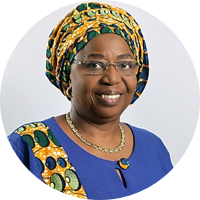
H.E. Prof. Awa Marie Coll Seck
Minister of State, Republic of Senegal
MD, PhD, Specialist in Infectious diseases and Bacteriology-Virology, Prof. Awa Marie Coll Seck is currently serving as Minister of State to the President of the Republic of Senegal since 2017. She chairs the National Committee of the Extractive Industries Transparency Initiative (CN-ITIE). She has twice been Minister of Health in Senegal (2001-2003 / 2012-2017) and was named “Best Minister in the World” in Dubai in February 2017 at the World Government Summit. She had the responsibility of directing the Department of Infectious Diseases at Cheikh Anta Diop University in Dakar, Senegal. Prof. Coll Seck was also Executive Director of the Roll Back Malaria Partnership (RBM) from 2004 to 2012, and Director of the Department of Policy, Strategy and Research of UNAIDS (1996-2001). She is a member of the Board of Directors of Grand Challenges Canada, of Resolve to save lives, of the Jury of the ISA Prize of Bahrain, and of the Jury of the Noguchi Africa Prize (Japan). She is also a member of the Advisory Board of the Harvard Ministerial Leadership Program (USA) and a member of the High Level Advisory Board of Examples in Global Health. She is also appointed as Unaffiliated Board Member and member of the Programme and Policy Committee of Gavi, the Vaccine Alliance. Prof. Awa Marie Coll Seck chairs the Scientific Committee of the Forum Galien Africa and is a member of the Honorary Committee of the Prix Galien Africa. She has authored of more than 150 scientific publications.
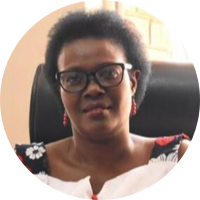
Honorable Margaret Muhanga
Minister of State for Primary Healthcare, Uganda
Margaret Muhanga Mugisa is a Ugandan Member of Parliament for Fort Portal North Division in Fort Portal Tourism City. She is currently the Minister of State for health in charge of primary health care. Before joining Parliament, she worked as a journalist for Uganda’s leading daily newspaper, The New Vision. She also worked in the office of the president as head of media and public relations. Margaret holds two Master's degrees in Development Studies, and Diplomacy and International Affairs. She also holds a Bachelor's degree in Social Sciences and a Diploma in Journalism.
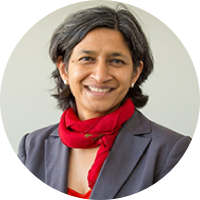
Mamta Murthi
Vice President for Human Development, World Bank
Mamta started as Vice President for Human Development at the World Bank on July 1, 2020. In this role she oversees the Global Practices for Education; Health, Nutrition, and Population; Gender; Social Protection and Jobs – as well as the Human Capital Project. Mamta has held many leadership positions at the World Bank, including as Director of Operations Policy (2019), Director of Strategy and Operations in Infrastructure (2018), Director of Strategy and Operations in the Africa Region (2015-2018), and Regional Country Director for the EU, based in Brussels (2012-15). An economist by training, she has had technical roles in Social Protection and Labor (1996-2004) and Education (2006-10). She was Deputy Director of the World Development Report on Development and the Next Generation in 2006. During 1998-2000, Mamta was MacArthur Fellow for Poverty and Inequality at King’s College, Cambridge. Mamta joined the World Bank as a Young Professional in 1995. She has a Bachelors’ Degree in Economics from St. Stephen’s College, University of Delhi and a DPhil in Economics from the University of Oxford. Mamta has written extensively on poverty, demography, education, pensions, and skills and is well-known for her econometric studies on fertility in India.
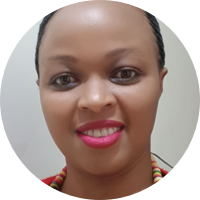
Nooliet Kabanyana
Executive Secretary, Rwanda NGOs Forum on HIV/AIDS and Health Promotion (RNGOF on HIV/AIDS & HP)
Ms. Nooliet is an ardent Civil Society Advocate of 114 CSOs working on Health and Human Rights Sector, which are members Organizations of Rwanda NGOs Forum on HIV/AIDS & Health Promotion (RNGOF on HIV/AIDS & HP) a National Network of Local NGOs which she heads. She represents and advocates for the CSOs and vulnerable communities at National and Regional level platforms such as the Health National Technical Working Group at the Rwanda Ministry of Health, Rwanda Bio-Medical Centre, CCM-Rwanda, National Technical Working Group at the Rwanda Ministry of Justice, Rwanda UN Technical Working Group, East African Community (EAC) Expert Technical Working Group among others. She is a member of GFAN Africa (Global Fund Africa Advocacy Network). Nooliet is currently the Focal Point supporting activities in the Eastern Anglophone Africa Region in the following Countries; Rwanda, Kenya, Tanzania, Tanzibar, Uganda, South Sudan, Ethiopia and Mauritius with the aim of effectively coordinating CRG Platform (Communication, Rights and Gender) activities hosted by Eastern Africa National Network for AIDS Services Organization (EANNASO).
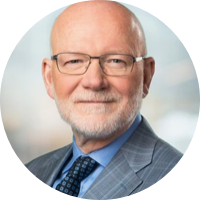
Dr. Chris Elias
President, Global Development Division, Bill & Melinda Gates Foundation
Dr. Chris Elias is the president of the Global Development Division, where he leads the foundation’s efforts in a diverse range of program areas aimed at finding creative new ways to ensure solutions and products get into the hands of people in poor countries who need them most. Focusing on areas with the potential for high-impact, sustainable solutions that can reach hundreds of millions of people, Chris oversees Global Development’s portfolio in Emergency Response; Family Planning; Maternal, Newborn & Child Health; Nutrition; Polio Eradication; and Vaccine Delivery. A common theme of these programs is innovative and integrated delivery, including an emphasis on strengthening of primary health care systems. Chris’s professional background is in public health and medicine. Prior to joining the Gates Foundation in February 2012, he worked in various positions and countries for international nonprofit organizations, most recently serving as the president and CEO of PATH, an international, nonprofit organization dedicated to improving the health of people around the world by advancing technologies, strengthening systems, and encouraging healthy behaviors. Chris holds an M.D. from Creighton University, having completed postgraduate training in internal medicine at the University of California San Francisco, and an M.P.H. from the University of Washington, where he was a fellow in the Robert Wood Johnson Clinical Scholars Program. He is a member of the Institute of Medicine.
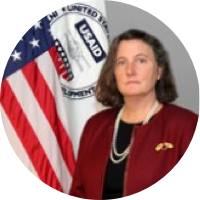
Dr. Jennifer Adams
Acting Assistant Administrator, U.S. Agency for International Development’s (USAID) Bureau for Global Health
Dr. Jennifer Adams is currently the Senior Deputy Assistant Administrator in the U.S. Agency for International Development’s (USAID) Bureau for Global Health. Most recently, she served as the USAID Mission Director to Mozambique. From 2014-2017, she served as the Bureau’s Deputy Assistant Administrator and then as Acting Assistant Administrator. Dr. Adams has served in USAID for 25 years holding positions in the Central Asian Republics, Senegal, Brazil, Mozambique, and Washington, D.C. Her positions included economist, and managing social sector portfolios, including health, education and environment projects. She served as USAID Mission Director in Brazil, and was appointed the first USAID development counselor to China in 2008. She headed USAID’s Office of Donor Engagement, where her duties involved analysis, communication, and collaborative efforts to generate joint understanding and action on key development priorities with both bilateral and multilateral donor partners around the world. Dr. Adams graduated from Johns Hopkins University, has a Master of Philosophy degree from the Institute of Development Studies at the University of Sussex and a Ph.D. in Economics from Cambridge University.

Dr. Monique Vledder
Head of Secretariat, GFF
Monique Vledder is the Head of the Secretariat for the Global Financing Facility for Women, Children and Adolescents (GFF). Monique's expertise in maternal and child health, health financing, and health systems strengthening has been built over 20 years of country experience with global development organizations. She led World Bank country programs on health systems reform and primary health care in Latin America and East and Southern Africa. She also managed the U.K. Department for International Development programs on women’s health, health financing and inequality in Brazil and led a portfolio of maternal and child health and nutrition programs for World Vision International in Indonesia. Prior to the establishment of the GFF in 2015, Monique managed the Health Results Innovation Trust Fund, an initiative that focused on innovations in health financing and front line service delivery. Monique holds an MD from the University of Amsterdam, an MPH in International Health from Harvard University and a diploma in health economics from the University of York.
Moderators

Adva Saldinger
Senior Reporter, Devex
Adva Saldinger is a Senior Reporter at Devex, where she covers the intersection of business and international development, as well as U.S. foreign aid policy. From partnerships to trade and social entrepreneurship to impact investing, Adva explores the role the private sector and private capital play in development. A journalist with more than 10 years of experience, she has worked at several newspapers in the U.S. and lived in both Ghana and South Africa.

